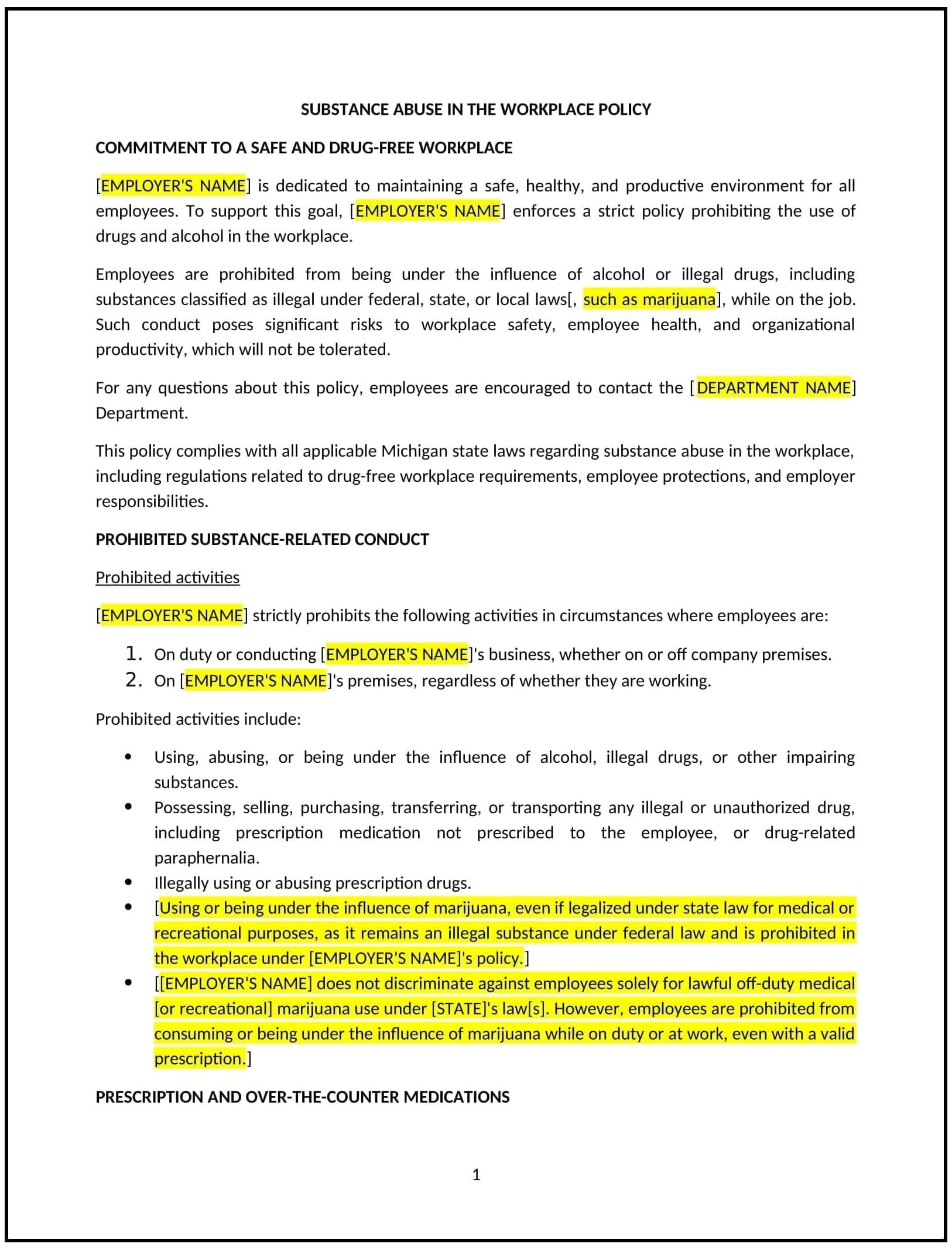Substance abuse in the workplace policy (Michigan): Free template
Got contracts to review? While you're here for policies, let Cobrief make contract review effortless—start your free review now.

Customize this template for free
Substance abuse in the workplace policy (Michigan)
A substance abuse in the workplace policy provides Michigan businesses with guidelines for preventing and addressing substance abuse among employees. This policy outlines expectations for maintaining a drug- and alcohol-free workplace, the steps for identifying and addressing substance abuse issues, and the resources available to employees for support. The policy also sets forth the consequences for violating workplace rules related to substance use, ensuring a safe, productive, and legally compliant work environment.
By implementing this policy, businesses can create a safer and more productive workplace, reduce the risk of accidents or poor performance due to substance abuse, and ensure compliance with Michigan state laws and federal regulations.
How to use this substance abuse in the workplace policy (Michigan)
- Define prohibited substances: Clearly state which substances are prohibited in the workplace, including illegal drugs, prescription medication not taken as prescribed, and alcohol. The policy should also specify whether employees are allowed to consume legal substances, such as alcohol, during work hours or at work-related events.
- Set expectations for behavior: Outline the behaviors that are not acceptable, such as coming to work under the influence, using drugs or alcohol during work hours, or possessing prohibited substances on business premises.
- Establish drug and alcohol testing procedures: Specify whether employees will be subject to drug and alcohol testing, including pre-employment, random, and post-incident testing. The policy should explain when testing will occur, the process for administering tests, and the consequences for failing a test.
- Offer support for employees with substance abuse issues: Provide resources for employees who may be struggling with substance abuse, such as employee assistance programs (EAPs), counseling services, or referral to treatment programs. Encourage employees to seek help before their substance use affects their work performance.
- Address disciplinary actions: Clearly outline the disciplinary actions for violating the substance abuse policy, including warnings, suspension, or termination, depending on the severity of the violation. Specify the process for handling violations and maintaining fairness and consistency.
- Promote a drug- and alcohol-free environment: Emphasize the importance of maintaining a drug- and alcohol-free workplace for the health, safety, and well-being of all employees. Highlight the business’s commitment to preventing substance abuse-related accidents or injuries.
- Ensure compliance with Michigan state and federal laws: The policy should align with Michigan’s laws regarding substance abuse in the workplace, such as the Michigan Medical Marihuana Act, and federal regulations like the Drug-Free Workplace Act.
- Review and update regularly: Periodically review and update the policy to ensure it remains compliant with changing laws, industry standards, and the evolving needs of the business.
Benefits of using this substance abuse in the workplace policy (Michigan)
This policy provides several key benefits for Michigan businesses:
- Ensures a safe and productive workplace: A substance abuse policy helps maintain a safe and focused work environment, reducing the risk of accidents, injuries, or poor performance related to substance use.
- Protects employee health and well-being: By offering resources for employees struggling with substance abuse, businesses can support their employees’ health and encourage them to seek help before issues escalate.
- Reduces legal and financial risks: Complying with Michigan state laws and federal regulations helps businesses avoid legal liability and financial penalties associated with substance abuse issues in the workplace.
- Promotes fairness and consistency: By setting clear expectations and guidelines, businesses ensure that all employees are held to the same standards and that violations are addressed consistently and fairly.
- Enhances business reputation: A workplace that takes substance abuse seriously and offers support for employees struggling with addiction can improve its reputation as a responsible and caring employer.
- Supports employee retention: By offering assistance and providing a safe and supportive work environment, businesses can increase employee loyalty and retention, reducing turnover and associated recruitment costs.
Tips for using this substance abuse in the workplace policy (Michigan)
- Communicate the policy clearly: Ensure that all employees are aware of the substance abuse policy by including it in the employee handbook, during onboarding, and in regular reminders about workplace rules and expectations.
- Provide training for managers: Train managers and supervisors on how to identify signs of substance abuse, address potential issues with employees, and support employees seeking help.
- Offer support resources: Provide information about available employee assistance programs (EAPs), counseling services, or treatment programs to help employees who may be struggling with substance abuse.
- Monitor the effectiveness of the policy: Regularly assess how well the substance abuse policy is working by reviewing incidents, conducting employee feedback surveys, and ensuring compliance with testing and support processes.
- Foster a supportive environment: Encourage a culture of support and understanding by creating a non-punitive approach for employees seeking help for substance abuse problems before they impact their performance.
- Review the policy regularly: Periodically review the policy to ensure it remains compliant with Michigan state laws, federal regulations, and the needs of the business.